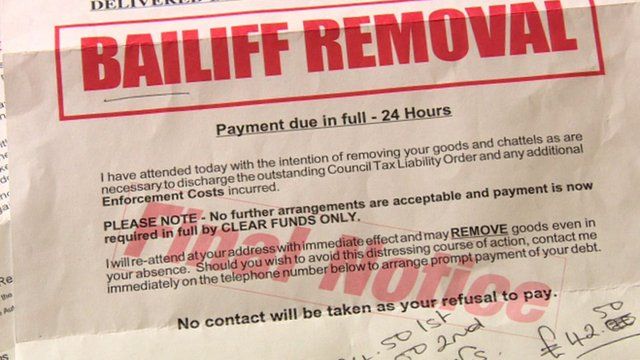

When bailiffs act against you, they are allowed to charge certain fees, which you are responsible for paying. There are also other charges that may be added to the bailiff's bill.
This page explains the fees and other costs that bailiffs can charge, and how fees are charged if the bailiff action is stopped at any point.
If you’re dealing with bailiff action that began before 6 April 2014, different rules may apply. You should get advice from your local Citizens Advice Bureau.
Bailiffs' fees
Bailiffs are allowed to charge a fee for each stage of the process of taking action against you. There are three separate stages, called compliance, enforcement and sale. For each stage the bailiffs can charge two fees, as follows:
For all kinds of bailiff action, apart from bailiffs acting under a High Court writ, the table below explains what is involved at each stage of the process, and how much can be charged for that stage.
| Stage of process | Action | Fixed fee | Percentage fee (over £1500 only) |
|---|---|---|---|
| Compliance | Writing to inform you of the debt, requesting payment, issuing an enforcement notice | £75 | 0 per cent |
| Enforcement | Visiting your home or business premises to take control of goods, including everything involved in identifying, valuing and taking control of your belongings | £235 | 7.5 per cent |
| Sale | Removing and selling the belongings that were taken control of in the previous stage | £110 | 7.5 per cent |
For bailiffs acting under a High Court writ, the fees are different. The percentage fees are charged on any money that is to be recovered over £1000. The enforcement stage is also split into two separate parts. Both the first and second stage enforcement fees can be charged where you don't reach a controlled goods agreement with the bailiff. This table shows the fees that bailiffs can charge for enforcing a High Court writ:
| tage of process | Action | Fixed fee | Percentage fee (over £1000 only) |
|---|---|---|---|
| Compliance | Writing to inform you of the debt, requesting payment, issuing an enforcement notice | £75 | 0 per cent |
| First enforcement stage | If you reach a controlled goods agreement with the bailiff and keep to the payments agreed, this is the only enforcement stage fee that will apply. It covers everything from the first visit to your property until the time the agreement is completed or broken. | £190 | 7.5 per cent |
| Second enforcement stage | If you don’t reach a controlled goods agreement with the bailiff or you fail to make the agreed payments, you’ll be liable for this fee in addition to the first enforcement stage fee. It covers visiting your home or business premises to take control of goods, and everything involved in identifying, valuing and taking control of your belongings. | £495 | 0 per cent |
| Sale | Removing and selling the belongings that were taken control of in the previous stage | £525 | 7.5 per cent |
As well as the fixed fees and percentage fees a bailiff can charge, you may also be billed for other expenses involved in the bailiff action. These are sometimes called disbursements. The costs charged must have been reasonably incurred and are limited to the following:
For all expenses, you have the right to see receipts and other evidence for the costs the bailiff has added to your bill, apart from online auction costs. The bailiffs can't charge you for anything that isn't included in the list above.
If a bailiff is chasing you for more than one debt, they have a duty to try to deal with them together and minimise the fees and expenses you are charged. Generally, this means you can be charged a separate compliance fee for each debt, but should only be charged once for the enforcement and sale stages. This only exception to this is if it isn't possible or practical for the bailiff to combine the actions against you.
You will receive a statement of the bailiff's fees and charges after your belongings are sold. This will be in a notice which explains:
If you stop bailiff action at any point during the process before your belongings are sold, for example by paying what you owe in full or agreeing a payment plan with the bailiff, you will still be liable for bailiffs' fees and other charges. Fees will be charged for any stage that has been started, even if that stage wasn't completed. For example, if the bailiff has visited your home, you will be charged the fee for the enforcement stage.
The bailiff must give you a bill which shows the following information:
If bailiff action stops because the bailiffs no longer have the power to act, the bailiff can't try to make you pay fees or expenses.